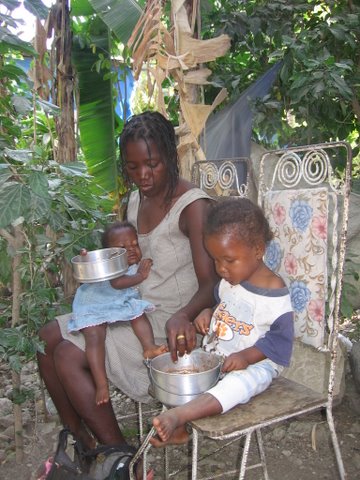HOW TO HELP* For more information about providing a $650 mule or a $50 stretcher for a village in Haiti, call the Children's Nutrition Program of Haiti at 423-495-1122 or send an email to contact@cnphaiti.org.* Donors can name the mules they sponsor and receive a picture of them.
Nutrition workers in Haiti often must walk up and down mountains for hours to reach the communities where they work.
Villagers sometimes must walk five to nine hours just to reach a road and find vehicles that can carry them to a hospital.
The Chattanooga-based Children's Nutrition Program of Haiti, which has been in the country since 1998, has a solution: mules.
In general, mules -- the offspring of horses bred with donkeys -- rarely become ill, can withstand temperature extremes, can live on frugal rations and have tremendous stamina and resilience with much longer working lives than horses, according to the British Mule Society and local mule breeder Deb Kidwell.
"I like to say mules are the original four-wheel drive vehicle because they are more sure-footed than a horse, with hybrid vigor, where they can be bigger and healthier than either of their parents," said Kidwell, owner of Lake Nowhere Mule and Donkey Farm in Martin, Tenn.
Kerry Kelly, the executive director of Children's Nutrition, said mules would help workers, known as monitrices, move around the rough terrain for their outreach education efforts, such as teaching mothers about breast feeding or measuring the growth of children or vegetable gardening.
"But more importantly, the mules will serve as an 'ambulance' to bring Haitians who are injured or ill down out of the mountains, where they can receive medical care," she said.
Each mules costs $650, she said, and the goal is to purchase 25 within the Haitian community. The animal will become the property of a monitrice who will feed and care for it.
Mule sponsors also get to name the animal and receive a picture of it, added Kelly.
In addition to the mules, the organization wants to raise funds to buy about 100 stretchers at about $50 apiece for community health committees so volunteers can physically carry the sick down the hills, said Kelly.
The Children's Nutrition Program of Haiti works in Leogane, Haiti, a rural mountainous town about 30 miles southwest of the capital of Port-au-Prince. The group focuses on early detection and treatment of acute malnutrition, but it is expanding its programs to include maternal nutrition and tackling the root causes of malnutrition with programs including safe water and women's empowerment, Kelly said.

